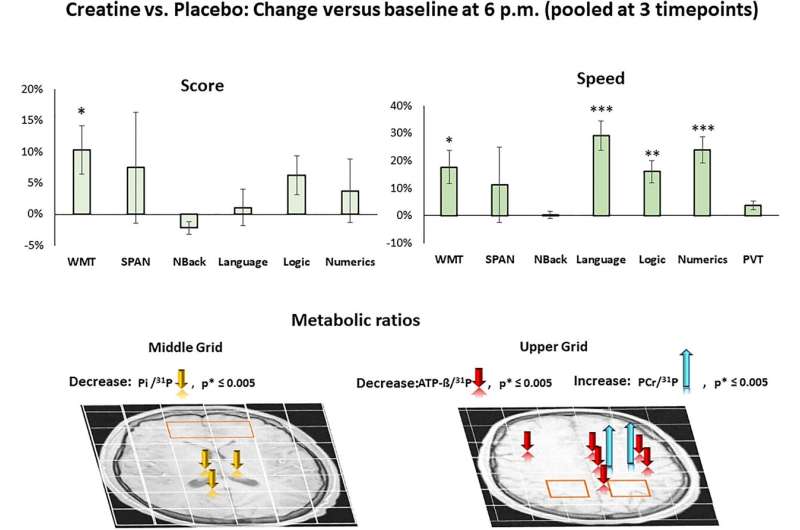
Creatine is a popular dietary supplement in the sports community that is used to improve physical performance. Researchers at Forschungszentrum Jülich have now discovered that a high single dose of creatine can temporarily improve cognitive performance that is reduced by sleep deprivation. The study findings are published in Scientific Reports.
As part of the study, 15 test subjects were kept awake overnight and had to solve cognitive tasks during this time. Sleep deprivation leads to changes in brain metabolism that promote the cellular uptake of creatine. Beforehand, the test subjects had received a high single dose of creatine, an important metabolic product that is found in food and can also be produced by the body itself.
Three hours after taking the creatine, a positive effect on the brain metabolism and cognitive performance of the test subjects could already be observed. The effect reached its peak after four hours and lasted up to nine hours. In particular, improvements in processing capacity and short-term memory were seen.
“The results suggest that a single but high dose of creatine enhances thinking capacity and causes changes in the brain’s energy reserves during sleep deprivation,” says Dr. Ali Gordjinejad, coordinator of the study from the Institute of Neuroscience and Medicine (INM-2) at Forschungszentrum Jülich.
Excessive intake of creatine not recommended
Various studies have already reported improvements in cognitive performance after a long creatine diet. The substance also counteracts the metabolic changes caused by sleep deprivation. This is why the Jülich researchers considered creatine a potential candidate for this study.
It had not previously been possible to prove the short-term effect that has now been observed, as the neuronal cells of the central nervous system (CNS) can only absorb creatine to a small extent. They normally cover their needs largely through their own synthesis. It was only by putting the brain in a “stressed” state through the experimental conditions in the Jülich study that the increased uptake of creatine in the cells was fostered.
“For the time being, however, it is not advisable for people to take such a high dose of creatine at home, as high doses of the substance put a heavy strain on the kidneys and can cause health risks,” says Dr. Gordjinejad. “However, if future studies show an increase in cognitive performance at lower doses, creatine might become a serious competitor to coffee during long working nights.”
More information:
Ali Gordji-Nejad et al, Single dose creatine improves cognitive performance and induces changes in cerebral high energy phosphates during sleep deprivation, Scientific Reports (2024). DOI: 10.1038/s41598-024-54249-9
Citation:
Creatine found to improve cognitive performance during sleep deprivation (2024, April 25)
creatine-cognitive-deprivation.html
.
. The content is provided for information purposes only.
